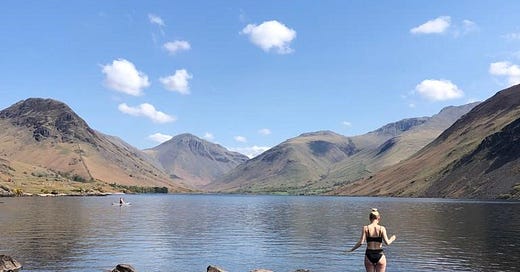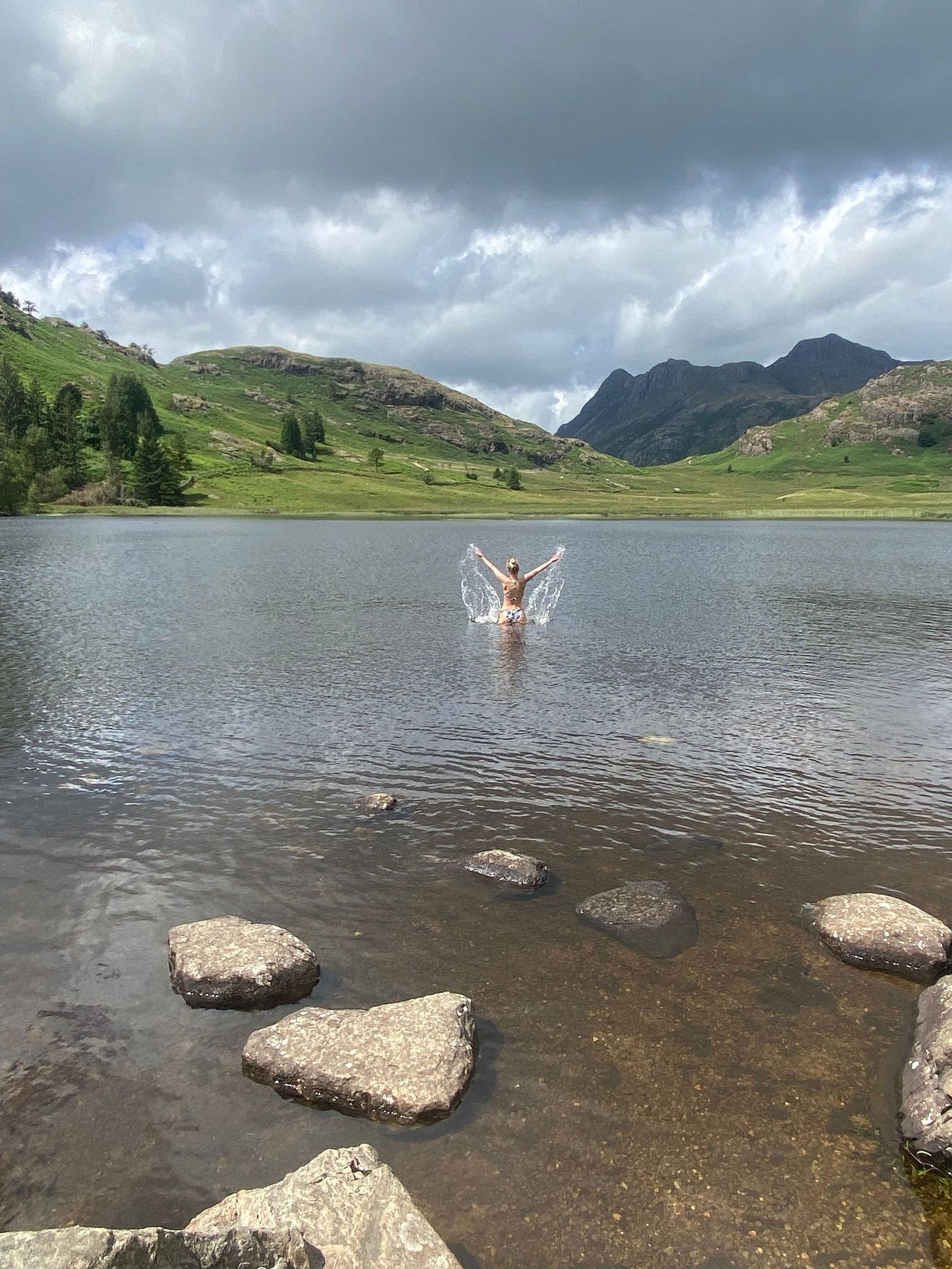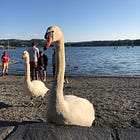‘Are you a wild swimmer?’ people would ask me when my novel The Wildwater Women came out. I’d say yes, explain that I’ve swum in the Cumbrian lakes and tarns since I was small, but somehow I still felt a flicker of self-doubt when I answered the question.
Was what I did really enough to count?
I’m a fiction writer, and if I’d written a crime book, I’m sure no one would expect me to be an actual murderer, yet here I was putting pressure on myself to be a ‘proper’ wild swimmer. But what did that mean? What would I have to do to feel like a ‘real’ one? If I went every day, all year round, was that the only way I’d feel confident answering the question?
I upped my open-water swimming as part of my book research process. I went from March to November – much colder months than I was used to – in single-digit temperatures and without a wetsuit to feel the sting on my skin and the icy bite of the lake on the back of my neck.
I was careful to always go with seasoned company. I was well aware of the risks, but even more conscious of the fact that I wasn’t an ‘actual’ wild swimmer – at least not in my own eyes.
But why not?
“I just liked the feeling of the water supporting my body and the thrill of seeing the world from a perspective that it’s impossible to get from dry land.”
Once The Wildwater Women was published I kept the swimming up, not only because I’d always loved being in the water but because I wanted to be a ‘genuine’ wild swimmer. But even after two years of dipping most days, I didn’t feel as though I’d earned the right to call myself that.
There were much more serious swimmers out there. People who swam lakes end-to-end. I’d never be in that league – I just liked the feeling of the water supporting my body and the thrill of seeing the world from a perspective that it’s impossible to get from dry land.
But perhaps I needed a different viewpoint when it came to swimming as a whole.
Such an all-or-nothing mentality doesn’t take into consideration the varied aspects of the activity. There are so many facets to the wild swimming experience: the exhilaration of being outdoors in the fresh air; the mindfulness of being absorbed in the moment; the physical sensations of being surrounded by cold water. There are myriad benefits to merely a two-minute immersion, meaning even dips of a very short length are valid and valuable.
Whenever a reader says to me they wish they were brave enough to give wild swimming a go, I’m quick to encourage them – simply dipping a toe in the water and paddling in the shallows can be an uplifting, life-affirming moment.
“We’re always so much kinder and more understanding towards others than we are to ourselves, particularly when it comes to achieving health and fitness targets.”
We don’t have to select a ‘level’, or compare our ability in terms of distance or hardiness. It’s possible to engage with wild swimming in so many different ways. As long as you’re safe, and respecting the countryside and your fellow humans, it can be whatever you want it to be.
So why don’t I cut myself the same slack as I do when speaking to strangers? We’re always so much kinder and more understanding towards others than we are to ourselves, particularly when it comes to achieving health and fitness targets.
Wild swimming is something you can appreciate regardless of miles and timings. Yes, if you’re a novice embarking on your very first dip, you definitely won’t feel in the same bracket as an instructor with years of experience and official qualifications, but you can still feel the same rush of endorphins and the buzz of being submerged in the water with a 360-degree duck’s eye view.
Comparison is the thief of joy, but excitement is the key to happiness. There is nothing more exhilarating than being surrounded on all sides by our glorious landscape and feeling the sensory delight of being immersed in nature.
So, how do we stop considering anything less than ‘ideal’ as a failure? This binary mindset is bad for our overall well-being after all as it sets us up for disappointment. Always seeking ‘perfection’ is unrealistic and sucks all the enjoyment out of physical activity.
The best method of tackling this way of thinking is to ask yourself whether you would say the same thing that you’re telling yourself, to someone you care about. If the response is no, then it’s time to reframe things in a more positive light.
So, if you’re being hard on yourself when it comes to training goals or fitness hopes, perhaps imagine you’re talking to a friend instead. What would you say to them? You’d remind them to see the bigger picture - that it’s not always about achieving stats but discovering the glimmers of joy along the way.
Ellie Wood is a Cumbrian author, swimmer, runner, and lover of the outdoors. Her books The Wildwater Women and The Restaurant at the Heart of the Lakes are available at all good bookshops. Her third book is out 13 March 2025.
For more on swimming, our edition from October covers the latest research in outdoor swimming & takeaways from Ged Dolan’s 1,000 days of swimming.








